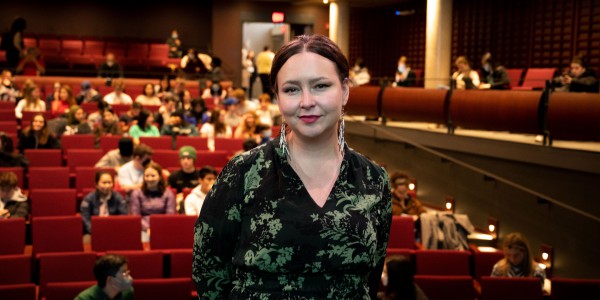Liz Howard: Indigenous Reconnection and Resurgence in Poetry

"Waabooz,
Tracking through the last of snow
love is a root I stumble over
in search of you.Geese fly backwards in my mind,
a rewind that a stand of tamaracks
sees just perfectly;“there is no way to trap
the anxious rabbit of me
as my hide also reorders itself
inside the brush of wide time.”
- Spring Letter, Liz Howard (McClelland & Stewart, 2021)
Liz Howard’s calm and centered voice echoes to the audience in the Isabel Bader Theatre of first-year students and faculty from the Vic One Program. As a mixed settler and Anishinaabe, Howard’s journey to becoming an award-winning poet was a personal one: a reconnection with her Indigenous family and background.
As the keynote speaker at a recent Vic One lecture, Howard shared personal details about her upbringing and creative contribution to Indigenous revitalization, reconnection and resurgence including using her craft to share her advocacy. The lecture is called “Against Assimilation: Anticolonial Poetics, Cosmology, and the Shaking Tent.” With the goal of developing critical thinking, research and writing skills, first-year students from the award-winning program Vic One attend a plenary lecture from a prominent guest speaker on a broad variety of topics every week.
Growing up away from her Anishinaabe relatives, Howard explained how she gradually reconnected with her father’s family and heritage throughout her life. “When I was young, I spent hours writing to my father and my Anishinaabe grandmother, in order to close the distance between us,” says Howard. “From the outset, my work was anti-colonial before I could acquire the vocabulary to describe it as such.”
A student asked Howard if studying psychology at U of T influenced the more experimental, conceptual and theoretical writing in her poetry. “Poetry closely mirrors my experience of the world as opposed to other kinds of writing," says Howard.
Howard is Victoria College’s Shaftesbury Creative Writer-In-Residence for 2022-2023. She is teaching, mentoring and inspiring students at Vic’s Creative Expression Society program as well as the Vic One Program’s Norman Jewison Stream.
Her first book, Infinite Citizen of the Shaking Tent, won the Griffin Poetry Prize in 2016, the first time it was awarded to a debut collection. During the plenary session, Howard showed birch bark representations of the shaking tent, an Anishinaabe ceremonial rite, conducted by a conjurer, connecting with manitou, animal-affiliated spirits, to receive beyond human knowledge. She proceeded to read the poem Thinktent from the book:
"[…]If you are in need of an answer
consult a jiisakiiwinini
scienctific rigour
psychoanalysis
the unconscious a construct
method amphibious
of two minds
that’s the translator
her task to receive
the call that comes
down the barrel
of the future”
- Thinktent, Liz Howard (McClelland & Stewart, 2015)
Letters in a Bruised Cosmos, Howard’s second book, was published in 2021 and was shortlisted for the Griffin Poetry Prize in the same year. Howard showed an image of the cosmic bruise. Tracking the cosmic microwave background that formed in space after the Big Bang, a NASA satellite discovered an unusually large cold spot compared to its surrounding area. One theory for this phenomenon is the collision of two universes, hence the existence of a “multiverse”.
With her love for cosmology, Howard uses the image and idea of the “multiverse” to examine the danger and necessity of living together: The ongoing impacts of colonization, particularly the ones that persist for generations. She also connects the cosmic bruise with bagone’giizhig, or a hole in the sky, which is a constellation in the Anishinaabe star map and is connected to the Ojibwe’s shaking tent ceremony.
“The poems in the book deal with grief, heartbreak and trauma, but they also attempt to invoke dreams of another world through the liberatory potential of language used as an ecstatic, generative, and propulsive force,” says Howard.
Included in the new book was the poem Letter from Halifax, which was an emotional telling of her final moment with her late father. With her voice slightly cracked, Howard paused for a moment then continued reading into the quietness of the consumed audience:
“[…]He passed from unknowing
into eternity as I watched the neon lines above him lie flat.
I am still watching. I still do not know what I know. A nor’easter
now passing over me, spilling its moisture from the Atlantic,
heavy rain that by midnight may turn to snow.”
- Letter from Halifax, Liz Howard (McClelland & Stewart, 2021)
